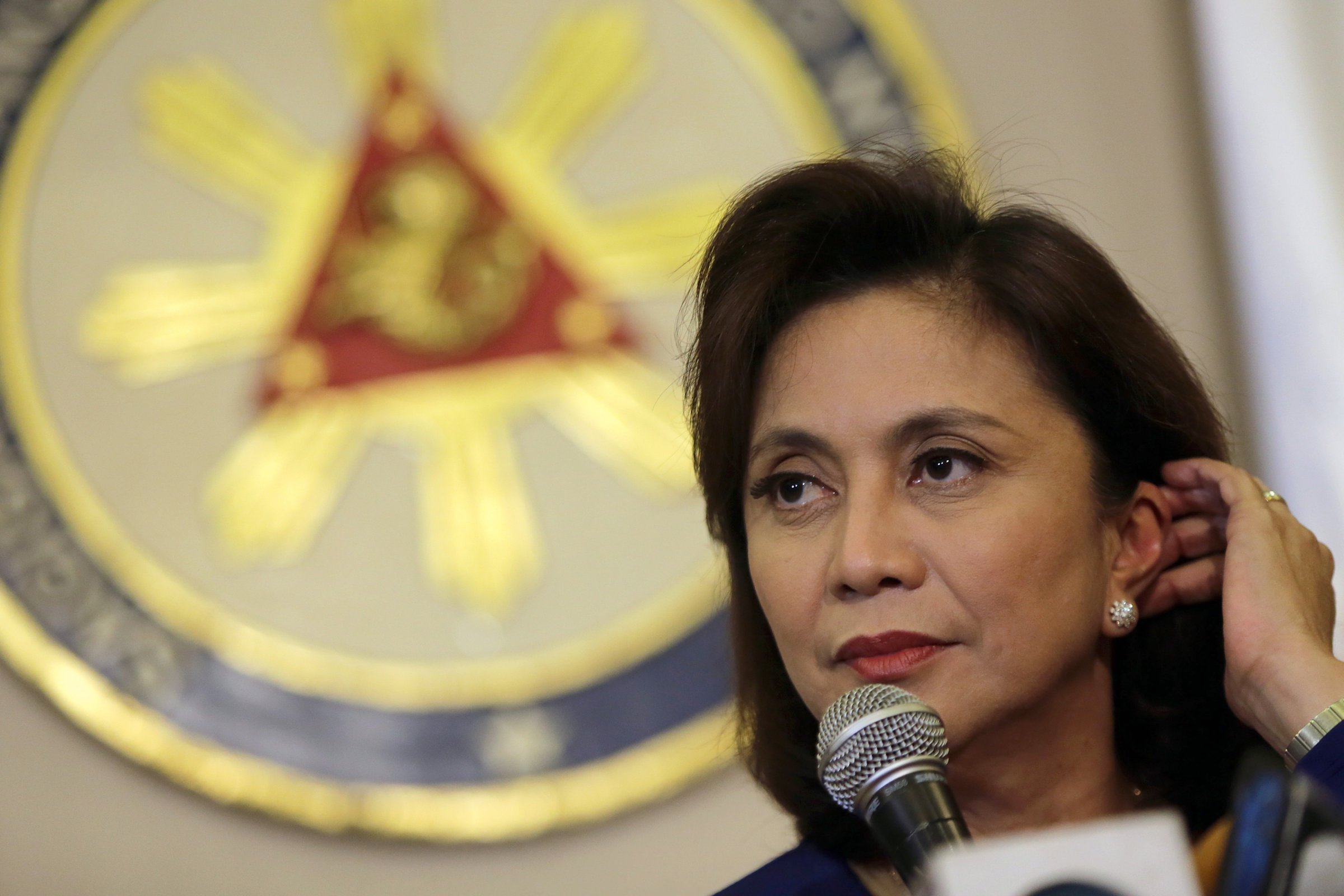
The Philippine Vice President Leni Robredo says that it is “inspiring” to witness growing opposition to the brutal war being waged against drugs in her country and has renewed her calls for an end to the slaughter in a written interview with TIME.
The stance puts her in stark opposition to President Rodrigo Duterte, who has made the savage suppression of suspected drug dealers and users a key tenet of his administration.
If the notion of a Vice President openly contradicting the head of state seems unusual, it’s because the two positions are elected separately in the Philippines. In the country’s May 2016 vice-presidential election, Robredo narrowly defeated Ferdinand “Bongbong” Marcos Jr., the son of the late dictator Ferdinand Marcos, whom Duterte favored.
This is not the first time Robredo has spoken out against Duterte’s policies. She was a vocal critic of the President’s decision to approve Marcos’ burial at the country’s Heroes’ Cemetery last year and in December Duterte blocked her from attending Cabinet meetings because the two had “irreconcilable differences.”
Robredo will address attendees at the 60th U.N Commission on Narcotic Drugs in Vienna in a video message Thursday that highlights human-rights abuses committed under Duterte. In the video, she notes inconsistent data relayed by the President in support of his war, in which more than 8,000 people have been killed since July 1. She also questions why no action has been taken on over 500 complaints filed at the Philippine Commission on Human Rights.
Robredo has repeatedly denied involvement in alleged plots to oust the President. In an email Q&A with TIME, she talks about the international community’s response to the drug war, and the arrest of another outspoken critic of the President, Senator Leila de Lima.
What do you hope your address to the U.N. commission will achieve?
The message was crafted by listening to Filipinos who have experienced human-rights violations and stories from the grassroots. Despite this dark environment, it is inspiring to see that there are still a lot of people who continue to fight for human rights and are standing up against extrajudicial killings in the Philippines.
Despite the ongoing culture of fear and death in our country, there are still leaders and people in our country who refuse to give up the fight for the rights of our countrymen.
What do you think of the international community’s response to Duterte’s drug war?
We are encouraged by the way the international community is pointing out and sounding the alarm on the increased number of human-rights violations in our country. We hope that they continue to be outspoken on their concerns.
We hope that in the next few months we, together with the international community, can convince the current administration to focus its efforts in ending human-rights violations and extrajudicial killings. In addition, let us work together to strengthen the existing accountability mechanisms in the Philippines in order for us to have those responsible brought to justice. We hope that we can persuade the administration to concentrate more on the bigger war we are facing — the war on poverty.
Has the U.N. response to human-rights abuses in the drug war been vigorous enough?
Yes, and we hope that they continue doing what they are doing. We hope they continue to engage our government through recommendations and pointing out the violations that they observe.
A few months ago, there were reports that a U.N. human-rights rapporteur would visit our country to investigate the ongoing violations and extrajudicial killings. We are still hopeful that this will eventually push through and that an independent and nonpartisan body may look into the problem more closely. In addition, we are grateful that international NGOs, such as Amnesty International and Human Rights Watch, have taken a closer look at the situation and are actively engaging the government to help solve and curb the human-rights problems in the country.
Leila de Lima has referred to herself as a political prisoner. Do you agree?
If we look into the chronology of her arrest, we can see how politically motivated the charges are. She has been charged with drug trafficking yet not 1 g of illegal drugs has been found in her possession.
This all started when the Senator pushed for a congressional investigation on the proliferation of extrajudicial killings. From there, she was publicly humiliated by the lower house in a series of scathing hearings. At the end of those hearings, the congressional committee did not recommend that charges be filed against the Senator. But the administration still went through with filing their cases and having the Senator arrested. This was an effort to silence a vocal critic of the administration.
Are you worried about speaking out publicly against the President given what has happened to de Lima?
No, because this is my duty as an elected official. We believe that in order for a democracy to be vibrant and healthy we must continue to voice out alternatives and other points of view. We cannot be disheartened by the noise around us because that would be an injustice for the Filipino people. As I said before, democracy demands dissent.
More Must-Reads from TIME
- Cybersecurity Experts Are Sounding the Alarm on DOGE
- Meet the 2025 Women of the Year
- The Harsh Truth About Disability Inclusion
- Why Do More Young Adults Have Cancer?
- Colman Domingo Leads With Radical Love
- How to Get Better at Doing Things Alone
- Michelle Zauner Stares Down the Darkness
Write to Joseph Hincks at joseph.hincks@time.com